Mom Uses Feet to Care for Baby After Being Paralyzed. Now She's Working to Stop the Disability Stigma (Exclusive)
At 22, Christina Mallon's arms slowly became paralyzed due to motor neuron disease
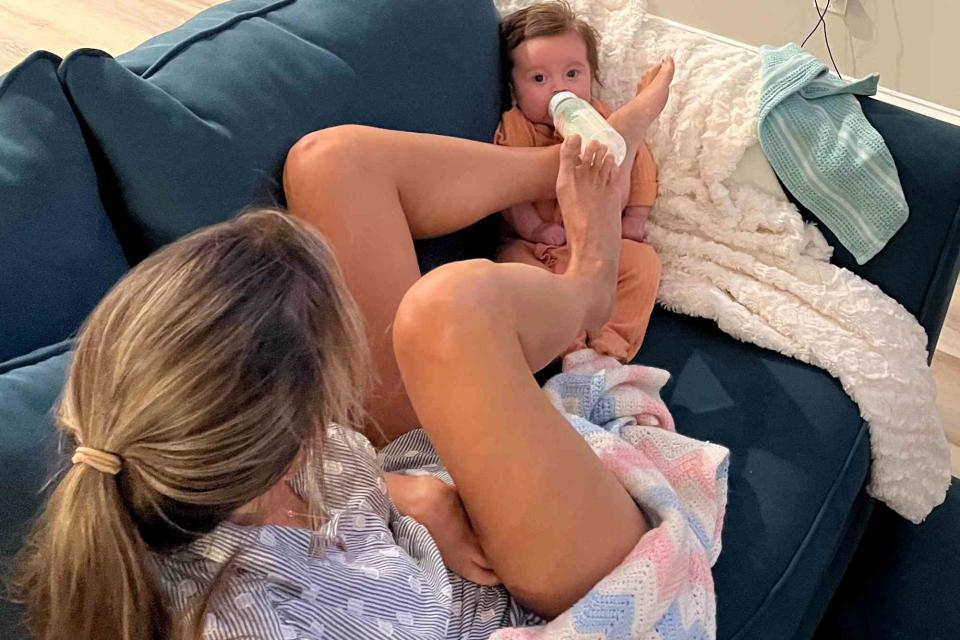
Christina Mallon doesn't let her disability stop her from being a successful working mom — she embraces it.
At 22, Mallon's arms slowly became paralyzed due to motor neuron disease. Fast forward a decade, the Microsoft executive is now a mom to daughter Margot, 22 months, and has learned to use her feet to care for both herself and her daughter, all while working at the forefront of the world of inclusive design.
"It was the first month of my full-time job coming out of college. I was working on creating ads and realized that I couldn't type as well. I thought it was because it was my first time working on a desktop computer in a few years given I worked on a laptop computer in college," Mallon tells PEOPLE.
As Mallon's condition continued to get worse — "every few months or few years I was losing the ability to move my fingers, elbows and shoulders," she says — doctors eventually diagnosed her with motor neuron disease.
"We were really on this wild goose chase of trying to understand what was causing this. Doctors believe that my case is extremely rare. I only know of one other person that has this," she continues. "I [live] every day not knowing if I'm going to lose the ability to use my legs or the ability to drink or eat. So I have just tried to use every day to make an impact on other's lives."
Mallon says she and her husband Jamie decided that one way to accomplish that goal would be to have a child and "to raise them to really understand that we are a village and we all need to work together to help others."
Never miss a story — sign up for PEOPLE's free daily newsletter to stay up-to-date on the best of what PEOPLE has to offer, from juicy celebrity news to compelling human interest stories.
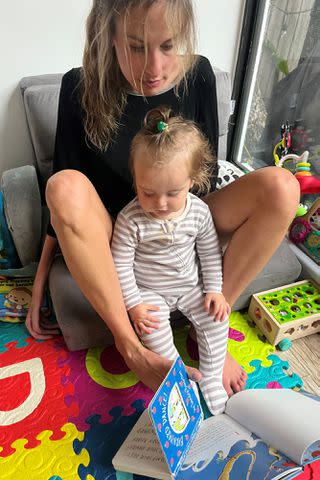
Before having Margot, Mallon became a pro at using her feet and figured out hacks to successfully complete tasks on her own.
"My friends never stopped texting me and work never stopped. So I had to figure out a way. Because my disability slowly happened over time, I would lose a different ability to use a part of my arms and hands every year," she explains. "Slowly over time I just tried using things, doing it with my feet, typing, texting, because I still had to get back to my friends and I still had to do my hair and do my makeup. I still had to be a part of society, one, for myself to really enjoy life and two, for other people with disabilities to understand that with the right amount of support and with the right products, you are able to live a full life."
While her husband was away at business school in Philadelphia, Mallon lived on her own for a year and was able to "figure out everything besides putting up my hair in a ponytail."
"I can change a diaper with my feet, I can wash my body, brush my teeth, do my makeup, feed myself, cook, clean all with my feet, and I'm able to use a lot with voice activation," she says.
When she first got pregnant, Mallon says she did her "due diligence to understand what is out there" in terms of accessible products, though she ultimately came up short.
"There really isn't much, so I knew that I kind of had to create and hack some things, which I did," she says. "I knew that I was coming up against a world that wasn't going to think that I could be a sufficient mom or that me being disabled wouldn't be a positive thing in my child's life."
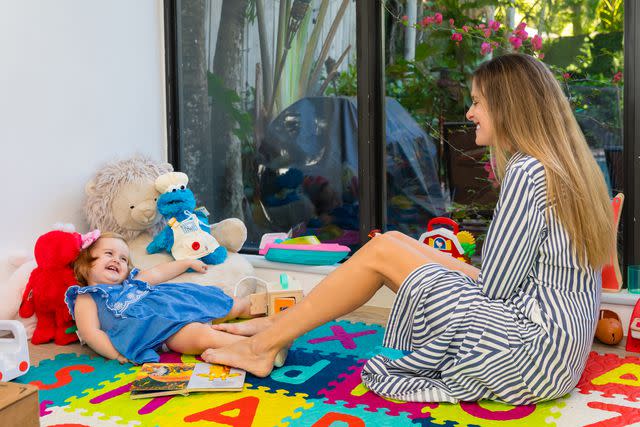
"When you read online, you don't see many great stories about disabled moms. They're out there. I interviewed a lot before I decided to get pregnant, but it's hard to find them. So I knew that I needed to be there and be that example to show more people with disabilities can be a mom," she shares.
"I was just really ready to take on that battle, knowing where people might give me a hard time, but I needed to build that inner earth roughness so that didn't break me down," she continues. "I definitely get sad when I'm at play dates and I can't do things with Margot the other moms do, but I keep telling myself I can help her in other ways and help her navigate life just through guidance. I feel super lucky to have her as my daughter."
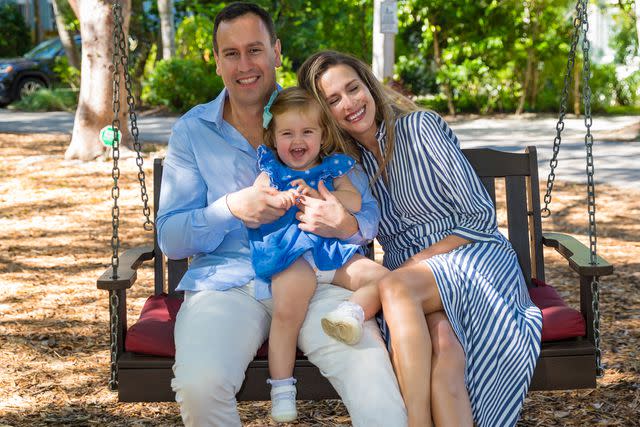
It wasn't the "hacking of my life that was the hardest," Mallon says; it was the "pre-existing ideas around what a good life looks like and then what a disabled person should be doing and if a disabled person should be a mom."
"Those were the stereotypes that were extremely hard for me," she continues. "I have people say to my nanny or my parents, I hope you're there 24/7 with her, with that baby. She can't be alone with that baby. In reality, I figured out that if there was a fire, how to get my daughter out if I was alone with her. I've figured out every scenario, but it still really hurts when people second guess my decisions as someone who works full-time or a wife or a friend, or as a mother."
At first, Mallon says it was a lot of "trial and error" to figure out how to use her feet to do things for others.
"[I was] feeding myself, washing my own body, but doing it for someone else was a new challenge," she recalls. "How do you get a bottle? How do you do a diaper? How do you chop up food?"
"Now Margot, when I drop something, she helps me or she always tries to imitate my husband. If he tries to feed me, she'll try to do it too. So it's really great to see a 22-month-old wants to provide kindness and help with me. I'm excited to see more of her kindness come out as she's exposed to the kindness of my husband and our nanny and other people who are willing to help me out so I can achieve some of my dreams."
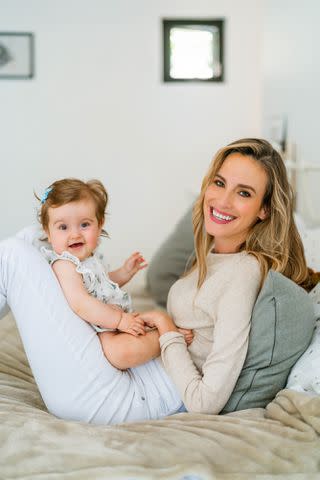
Carly Terenzio
Christina Mallon and her daughter Margot.While watching her mom, Margot has also taken to using her feet, which Mallon says she and her husband try to steer her away from.
"She gets slightly confused and she's also putting things a lot in her mouth. So I will put things in my mouth to grab it from point A to point B, and she starts to do that too, even though she is fully able-bodied and not disabled," she says. "If she wants to grab or use my cellphone or my husband's she'll hand my husband his cell phone, but she'll drop my cell phone on the floor because she knows that I type with my feet."
"It's really cute and endearing," Mallon adds. "She's definitely mimicking and starting to understand the dynamic of the household. Every household is super unique and ours is just a little bit different."
Mallon is also helping to spread awareness in her own community. "What I started to do is if there was a bunch of little girls on our street and they didn't understand why I wasn't picking up Margot, I gave them a disabled Barbie so that they could understand, oh, being disabled is cool. Even a Barbie can be disabled, to put it into their language so that I wouldn't make them scared of me and not want to play with Margot or play with me."
"That's kind of how I navigate it. I'm just very upfront about my challenges so that people understand. People are very quick to judge."
In the workplace, Mallon leads inclusive design across Microsoft where she makes sure technology considers the needs of the disability community. She is also on the board of Open Style Lab, which "works to take engineers, fashioned designers and occupational therapists with and without disabilities and partner with the disability community to make accessible fashion."
"I knew that technology would be a huge part of my daughter's life and everyone's life," Mallon tells PEOPLE. "If I could get in there to help shape a more accessible technology, it would be the best for myself, the community, and my daughter."
For more People news, make sure to sign up for our newsletter!
Read the original article on People.

 Yahoo Lifestyle
Yahoo Lifestyle 
